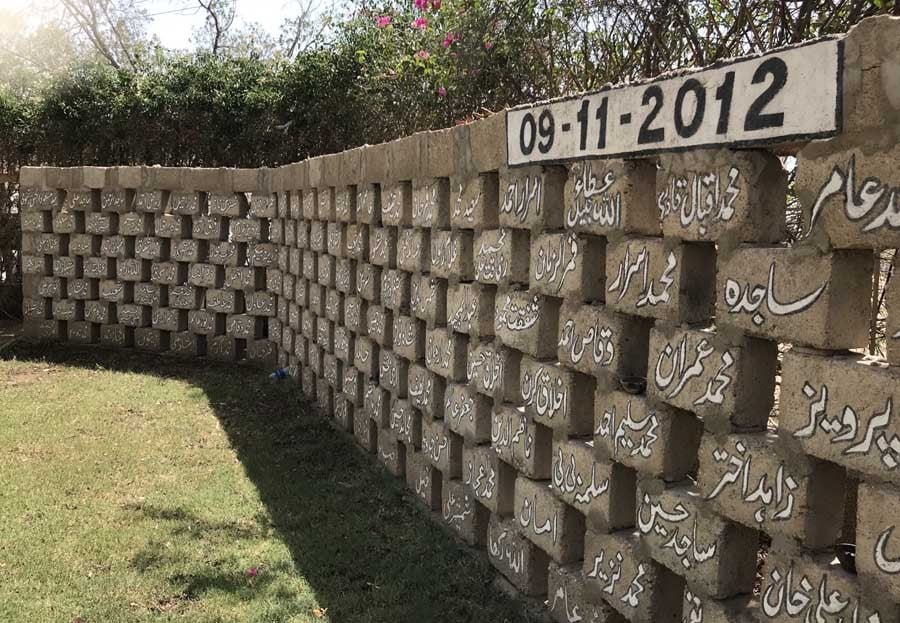
The government should honour its promises of making life better for labourers and unemployed youth

A memorial wall built in the lawn of the Pakistan Institute of Labour Education and Research (PILER) -- a non-profit organisation working for labour rights, peace and advocacy for the past 35 years, comprised 258 brick stands. Brick by brick the names of the deceased victims of the ill-fated Baldia Factory Fire were inscribed on the wall, which commemorates the loss of precious lives.
It’s been more than six years since the fatal fire incident took place. On September 11, 2012, a massive fire at the Ali Enterprises (Pvt. Ltd.) -- a four-storey garments factory located in the Baldia Town area -- burnt 258 workers alive and injured about 59. The number of deaths, as a result of the fire, still remains contentious. Official estimates suggest the number was 258 while others quote it to be 260. A few unofficial sources have also quoted it to be 285. Many bodies remain unidentified till date.
The bricks do not bear names of all the victims of the fire, but they do remind one of the tragedy that took away so many of the young, aspiring individuals, most of whom were sole bread-earners of their families. The memorial stands as a reminder of how the lives of these hard-working men and women were full of dreams. The loss of lives in the Baldia Factory fire is also loss of the nation’s dynamic youth that may have possessed a different vision.
Six years on, the perpetrators of the crime remain at large. The young men and women, who worked at the garments’ factory could not escape. Whether it was a pre-planned activity? The case is subjudice. What we can shed light on is the fact that it was a case of criminal negligence.
More than 1,500 workers in the four-storied structure were locked inside. The factory had just two exits, one of which was always locked. Several workers attempted to jump from the windows in a bid to save their lives, following which they suffered horrible injuries that left them handicapped for life.
Arrests were made after the fire took away precious lives in a matter of minutes. People were locked behind bars, conspiracy theories emerged, accusations were hurled at but the criminals are yet to be punished. Families of the 209 victims may have received temporary relief after the German textile company KiK Textilian - that had its clothes manufactured at Ali Enterprises (Pvt. Ltd.) - compensated for the loss of workers’ lives in the form of long-term compensation after the signing of a Memorandum of Understanding (MoU) between KIK and PILER. However, the state of labour laws in Pakistan is an open secret. Despite the presence of strict laws, implementation remains an issue.
Most of the deceased were aged between 18-34 years. What could have been done to save them has been discussed time and again, but what hasn’t been taken into consideration is whether these young men and women were as important in the corridors of power as the youth they otherwise claim to empower?
Pakistan’s youth aged 18 to 35 years is 47 per cent of the total registered voters. They voted for their desired candidates in one of the country’s most talked-about elections last year. Now the question arises whether the political parties, which these young voters chose to vote for, have implemented policies they claimed in their manifestos?
The rate of out-of-school children is 25 per cent, which makes approximately 22 million of the country’s total population. Around 64 per cent of Pakistan’s population is below the age of 30, while 29 per cent is aged between 15 to 29 years. The growing number of young people requires education and training in order to be deemed a demographic dividend. These young individual require the attention of the state, for if they remain neglected, poor and uneducated, Pakistan’s economic growth rate will suffer from its adverse consequences, as well as witness a social, moral and ethical downfall.
Released as part of the election campaign, the current government’s manifesto stated that they will "strengthen the labour market and create 10 million jobs over five years in key sectors". The manifesto stated that the country’s youth can become its "biggest asset" and that it can be the biggest challenge, which may lead to severe economic and social consequences if action is not taken.
But how much of the manifesto’s implementation do we see eight months down the line? It isn’t just the present government that needs to be questioned; in fact, what has happened in the past also doesn’t paint a very good image.
Pakistan’s youth, no matter what social class they belong to, have little to no trust in the government. Having worked on a programme with Karachi’s youth on both the community and academic level, one finds that the younger generation is first and foremost concerned about issues they encounter on a daily basis, which is fair on their part, for they are first entitled to receive these basic facilities and maybe later talk about issues that require critical thinking.
From lack of sanitation to water shortage in the city, from lack of public transport to lack of employment in the country - these are the issues that the youth of Pakistan want resolved. In order for the youth to discover its full potential and for them to play their part in taking the country forward, long-term and effective policies are the need of time, as they would ensure that these young individuals get the opportunity to think out-of-the-box and not just dwell upon the age-old problems.
To improve the lives and livelihood of the young men and women working in the labour sector as well as their families, the state should increase expenditure on education, social protection and health. The young crop of workers requires special attention on them to restore their trust in the state.